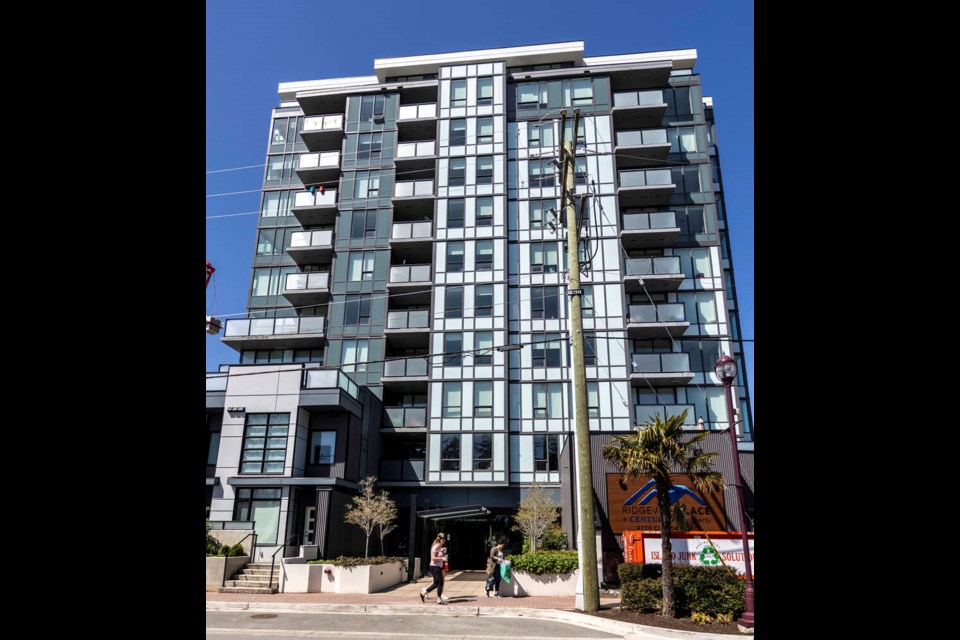A commentary. Emily Rogers is director of operations at Together Against Poverty Society, where Doug King is executive director.
The recent eviction of tenants from RidgeView Place, the 90-unit high-rise in downtown Langford, has exposed huge deficiencies in our tenancy laws.
On April 24, building owner Centurion Apartment Properties Inc. sent each resident a letter ending their tenancies immediately by claiming frustration of contract due to “serious concerns with certain structural elements of the building.”
While Centurion has used words like “evacuate” and “vacate,” we must make no mistake of what they are really trying to do, which is to permanently evict these tenants from the building.
In doing so they seek to wash their hands clean of their obligations under the Residential Tenancy Act, and to the tenants they have signed leases with. So far, the government has been powerless to stop them.
“Frustration” is a legal concept meaning that an unforeseeable event has made it impossible for the contract to continue. When a tenancy is rightfully frustrated, the landlord is released of all liabilities to the previous tenants and there is no requirement to provide the tenants with support or compensation.
The economic incentive for landlords to declare a tenancy frustrated instead of ending the tenancy a different way is two-fold: supporting tenants is costly, and ending tenancies allows landlords to re-rent the units at a much higher rent when they are safe for re-occupation.
While the Residential Tenancy Branch says a contract should only be frustrated when that unexpected event “is beyond anyone’s reasonable control,” there is virtually nothing preventing a landlord in a situation like this from simply declaring a tenancy as frustrated.
Technically, tenants can try to challenge that decision through the branch, but expecting suddenly-homeless tenants to apply for dispute resolution a time like this is unreasonable. Tenants are preoccupied with finding somewhere for their family to sleep and figuring out how to meet their basic needs for the coming weeks and months.
Instead of allowing landlords to unilaterally declare the end of 90 tenancies in the blink of an eye, a better system would be for the branch to work proactively with local governments, landlords, and tenants to determine whether these tenancies are frustrated, or if they can continue after remediation work is complete.
After all, the province just spent the better part of the past two years changing our laws to prevent a landlord from being able to renovict a tenant without first getting approval from the branch, so why would we allow it here?
Requiring a landlord to apply to the branch in order to frustrate the tenancies and having an official determination from an independent party would provide both tenants and landlords with certainty regarding the legal status of their homes, removing the burden of responsibility from tenants who have much more pressing survival needs.
If it is found that Centurion was somehow negligent in upholding their responsibilities to ensure building safety, they must compensate tenants for losses and suffering, and they should be responsible for reimbursing the money the provincial government has had to allocate to support the tenants they have left behind.
Centurion stated in its 2021 annual report that it is buying newer apartment buildings in Western Canada because these “newer and modern properties generate higher rents, attract stronger residents, require much less ongoing maintenance and capital spending, and serve to further strengthen and diversify our overall portfolio.”
It’s safe to say that this did not go according to plan with RidgeView Place.
We know from the annual report that they are an extremely profitable Real Estate Investment Trust. According to the report, “total assets of the Trust increased 24.2 per cent from $3.3 billion as at December 31, 2020 to $4.1 billion as at December 31, 2021” and their net operating income increased to $107.8 million in 2021.
In this context, the $1,000 originally offered to tenants should be placed within the extreme power differential between the parties.
Centurion’s only reason for existence is to generate profits for its stakeholders, whereas tenants are renting in order to meet a basic need. When something goes wrong and tenants are made homeless overnight, with a landlord being allowed to walk away without consequence, it is our community that suffers.
>>> To comment on this article, write a letter to the editor: [email protected]



